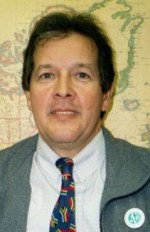Geography professor a Fulbright Scholar in South Africa
Reprinted from Bridgewater Today September,
2001.
A native of South Africa, Dr. Vernon Domingo, a geography
professor at Bridgewater State College, was in his own words, “one of the
disenfranchised under the apartheid system.” Now more than 25 years after
he was expelled from one of the South African “ethnic” universities, the
University of Western Cape (limited to “Coloureds”) and blacklisted for
political activism, he will return to his homeland as a Fulbright Scholar
for the first eight months of 2002. This is the second time that Dr. Domingo
has been selected as a Fulbright Scholar. His first Fulbright experience
was in 1994, when he traveled to Suriname, South America. Dr. Domingo
is one of approximately 110 Americans who have been selected for the 2001-2002
academic year to teach or conduct research in 27 African countries. It
is not a coincidence that he is
returning to his homeland, in fact, he applied specifically for this
charge for
several reasons. "I want to witness how life has changed for the peoples
who |
 |
remained in
South Africa since the elimination of apartheid. I also want an opportunity
to use my skills as a
geographer
to contribute to the reconstruction of my birthplace,” said Dr. Domingo.
The application
process, which takes almost a year, concluded in April when Dr. Domingo
received
his announcement
letter from the Fulbright Commission.
He will
be teaching two courses at the University of Fort Hare in Alice, South
Africa, one of the
oldest
historically Black universities in Africa. One course will be on research
methods, with a
strong
emphasis on those techniques that are especially appropriate in Third World
settings where
applied
research is needed for social and economic development. The second course
will focus on
the African
environments, which will emphasize how development on the continent is
affected by the
interaction
between humans and their changing physical and cultural environments.
“I will
be dividing my time between teaching these two courses and doing research
in the field,” said
Dr. Domingo.
“My research will focus on how households and local communities evaluate
their
water
resources and how they organize to gain access to this critical resource.”
Water is
a particularly scarce resource in the Eastern Cape region, which has a
historically low
rainfall
and is experiencing more damaging droughts then ever before.
“As a geographer,
I am focusing on water needs because obtaining water for household needs,
drinking
and sanitation is perhaps the most intense relationship that individuals
have with the
environment,”
said Dr. Domingo.
Beyond
his work in South Africa, Dr. Domingo believes his experiences will also
benefit the college.
“I teach
my students that we live in a global society where every place has a connection
to each
other.
This Fulbright Scholarship will help me to learn more about the world so
that I can share it
with my
students when I return.”
He is also
looking forward to visiting with his parents, siblings and their children,
who still live in
South
Africa. Life for his relatives is much different than the world he left
so many years ago.
“My parents
know that their grandchildren in South Africa now have choices and opportunities
open to
them that their own children never had. Universities that were once off-limits
to some are
now open
to everyone,” said Dr. Domingo.
His wife
and two children will accompany him for part of his stay.
“For my
children, this is an opportunity for them to have enriching experiences
and to see the world
through
different eyes. I hope that through this experience, they will see that
people all over the
world
strive for basically the same things — food, shelter, clean water and good
health — but also
for the
broader issues of a strong community, a caring family and the dignity which
makes us all
human.”
Return to MGA Homepage
